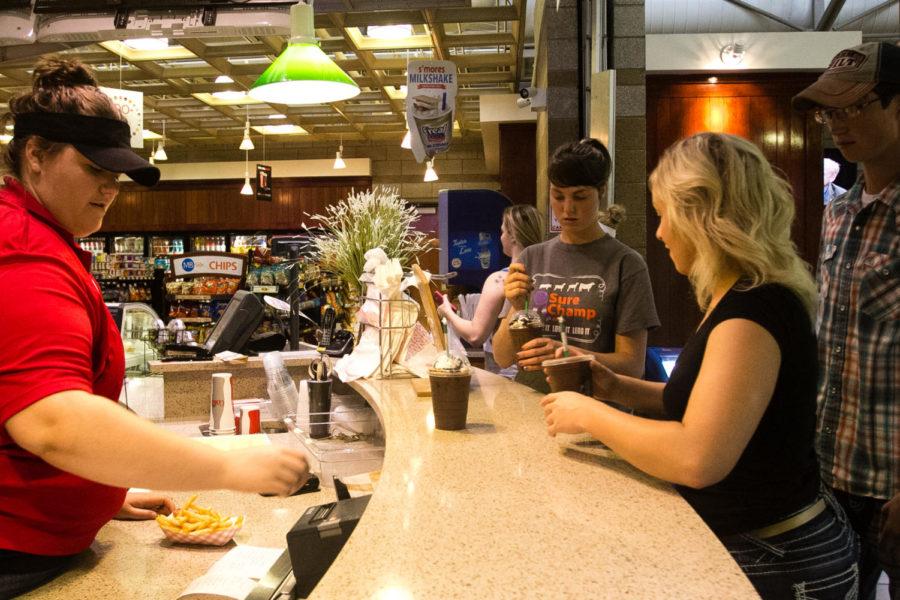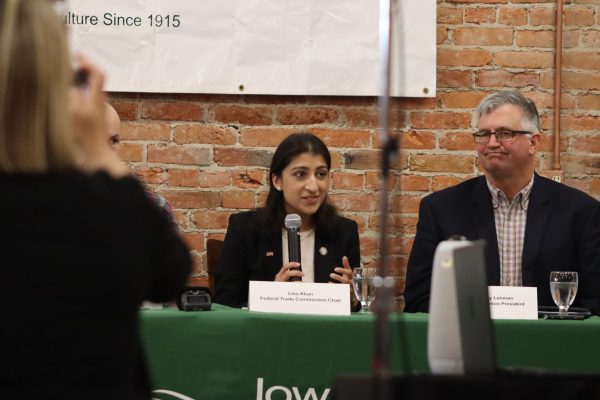Iowa State searches for new dining director
Tomhas Huhnke/Iowa State Daily
Hawthorn serves breakfast pizza, sandwiches and pastries.
October 19, 2015
Students and faculty may say the various dining centers have remained a pivotal part of campus life, but since December of 2014, Iowa State has been without it’s official dining director of almost nine years, Nancy Keller.
The responsibilities have been deferred to Tom Hill, vice president for Student Affairs, while the search to fill the position has begun.
“We contracted with a group called Spelman and Johnson in late summer to facilitate the search,” said Martino Harmon, associate vice president for Student Affairs. ”They advertised the position and communicated with people all over the country. Their function was to generate a pool of qualified applicants.”
After the initial search, Mark Hall, a representative of Spelman and Johnson, assessed the pool group and brought 12 names of possible candidates for the position to the dining director search committee, which is headed by Harmon and eight other members.
“We’ve been given the applications of about 10 or 12 that Mark Hall says are good enough for our consideration,” Harmon said. “He came and met with us in advance and we read through each one and gave our feedback. Now we’ve narrowed down that list from 12 to 8. Where we are at now is phone interviews with those eight.”
The number of candidates remaining after the phone interviews will be cut even further, until the remaining few are invited onto campus for a guided tour within the first two weeks of November.
Although at first glance the role of a dining director may seem self-explanatory, it’s not just about running the various dining centers located on campus.
”First and foremost, the goal is to provide leadership, so we can have a dining program that students will like and use,” Harmon said. “This includes management of staff. We have over 1,500 students who work in the ISU Dining department, and the rec management team for the different dining halls.”
The dining director is also expected to manage the budget and provide financial oversight.
“We are looking for those who are creative and have a vision, for not only what our dining program looks like now but also what it can look like in the future,” Harmon said.
Innovation and creative thinking was a focal point for the search committee as enhancements to the dining program under Keller were a success among students. The Global Café in Curtiss Hall and Courtyard Café in Lagomarcino Hall were both created by Keller in order to evenly distribute students searching for a snack across campus.
“Another big push for Nancy was trying to use Iowa products, to use food that was grown in Iowa as much as possible. It was a big emphasis,” Harmon said.
The push refers to the Farm to ISU food program, which was initiated in 2007 to increase the purchases of local Iowa based foods. Currently, 12 percent of all ISU Dining food products stem from this program.
Food programs like Farm to ISU make the dining program unique when compared with other colleges across the country. Unlike other institutions, Iowa State does not run the manufacturing of its food through a contractor, but is instead independent. Contracted dining programs will hire companies to cook and ship food products to the school instead of making the items in-house.
”Our dining program is self-operated, which allows us to be more creative, more responsive and connected with the overall student experience,” Harmon said.
Sustainability efforts were also enforced campus-wide to reduce wasteful practices and harm to the environment. Iowa State has done away with trays as a way to reduce food waste and control student portions.
“Going trayless was intentional, as students when given a tray tend to just pile on food and a lot of that goes to waste,” Harmon said. “Whereas if you get a plate, you tend to get only what you need and be less wasteful.”
Measures like these were all parts of the initiatives Keller created.
For the dining director search team, having student input for the future of the dining program was an important goal. Because of this, two students — one from the Inter-Residence Hall Association and the other from Student Government — are a part of the current search committee.
Rachel Greifenkamp, senior in interdisciplinary studies and president of the Inter-Residence Hall Association, is one of the students on the search team and was chosen for her role based on her involvement with the student body.
”I represent all of the students who live in residence halls and because the director of dining has such a direct impact on students who live on campus, they thought it would be important to ask me,” Greifenkamp said. ”I thinks it’s really cool that they wanted student input on this decision.”
Harmon said IRHA holds an equally important position during the search.
“They have the same voice as anybody else on the committee,” Harmon said. “Their opinions and viewpoints we really want to hear. The position is someone we want students to be comfortable with, so they know if they aren’t speaking up, I’ll ask what they are thinking.”
Greifenkamp believes it will be important for the future dining director to listen to students and take requests.
”I want someone who not only has the experience and knowledge to back them up and help them be successful in this position but also someone who will take input from students when they get here,” Greifenkamp said. “It’d be neat to find someone who can learn a lot in their first few months here and be able to make improvements as they prolong their stay.”
Greifenkamp is currently working with the rest of the committee on phone interviews and will soon conduct guided tours of the campus to potential directors.
“We are hoping if everything works out to possibly name a new director maybe right before or after Thanksgiving,” Harmon said. “And then depending on where that person is coming from, we’ll have them start in January.”
















